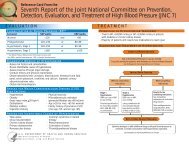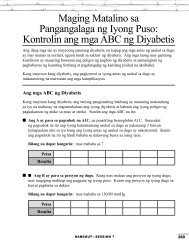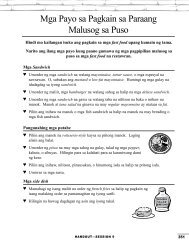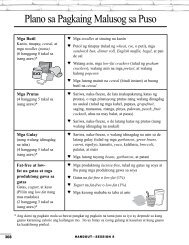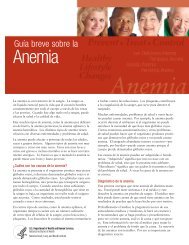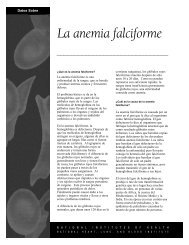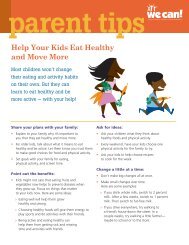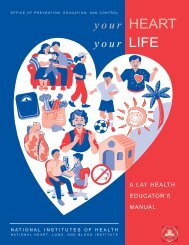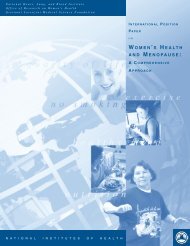HeartsNParks Community Mobilization Guide - National Heart, Lung ...
HeartsNParks Community Mobilization Guide - National Heart, Lung ...
HeartsNParks Community Mobilization Guide - National Heart, Lung ...
Create successful ePaper yourself
Turn your PDF publications into a flip-book with our unique Google optimized e-Paper software.
the weight loss. A steady weight loss of 1<br />
to 2 pounds a week is safe for most adults,<br />
and the weight is more likely to stay off<br />
over the long run. Losing weight, if you<br />
are overweight, may also help reduce your<br />
blood pressure and raise your HDL-cholesterol,<br />
the “good” cholesterol.<br />
7 False. To cut calories, some people<br />
regularly skip meals and have no snacks<br />
or caloric drinks in between. If you do<br />
this, your body thinks that it is starving<br />
even if your intake of calories is not<br />
reduced to a very low amount. Your body<br />
will try to save energy by slowing its<br />
metabolism—that is, decreasing the rate at<br />
which it burns the calories. This makes<br />
losing weight even harder and may even<br />
add body fat. Try to avoid long periods<br />
without eating. Five or six small meals are<br />
often preferred to the usual three meals a<br />
day for some individuals trying to lose<br />
weight.<br />
8 True. Contrary to popular belief, foods<br />
high in complex carbohydrates (like pasta,<br />
rice, potatoes, breads, cereals, grains,<br />
dried beans and peas) are lower in calories<br />
than foods high in fat. In addition, they<br />
are good sources of vitamins, minerals,<br />
and fiber. What adds calories to these<br />
foods is the addition of butter, rich sauces,<br />
whole milk, cheese, or cream, which are<br />
high in fat.<br />
9 False. Sugar has not been found to cause<br />
obesity; however, many foods high in<br />
sugar are also high in fat. Fat has more<br />
than twice the calories as the same amount<br />
of protein or carbohydrates (sugar and<br />
starch). Thus, foods that are high in fat are<br />
high in calories. High-sugar foods, like<br />
cakes, cookies, candies, and ice cream, are<br />
high in fat and calories and low in vitamins,<br />
minerals, and protein.<br />
10 True. All fats—polyunsaturated,<br />
monounsaturated, and saturated—have<br />
the same number of calories. All calories<br />
count, whether they come from saturated<br />
or unsaturated fats. Because fats are<br />
the richest sources of calories, eating<br />
less total fat will help reduce the number<br />
of calories you eat every day. It will also<br />
help reduce your intake of saturated fat.<br />
Particular attention to reducing saturated<br />
fat is important in lowering your blood<br />
cholesterol level.<br />
11 False. Obesity in childhood does<br />
increase the likelihood of adult obesity,<br />
but most overweight children will not<br />
become obese. Several factors influence<br />
whether or not an overweight child<br />
becomes an overweight adult: (1) the<br />
age the child becomes overweight; (2)<br />
how overweight the child is; (3) the<br />
family history of overweight; and<br />
(4) dietary and activity habits. Getting to<br />
the right weight is desirable, but children’s<br />
needs for calories and other nutrients are<br />
different from the needs of adults.<br />
Dietary plans for weight control must<br />
allow for this. Eating habits, like so<br />
many other habits, are often formed<br />
during childhood, so it is important to<br />
develop good ones.<br />
NHLBI Health Information Center<br />
P.O. Box 30105, Bethesda, MD 20824-0105<br />
phone: (301) 592-8573 fax: (301) 592-8563<br />
Obesity & Overweight 59



